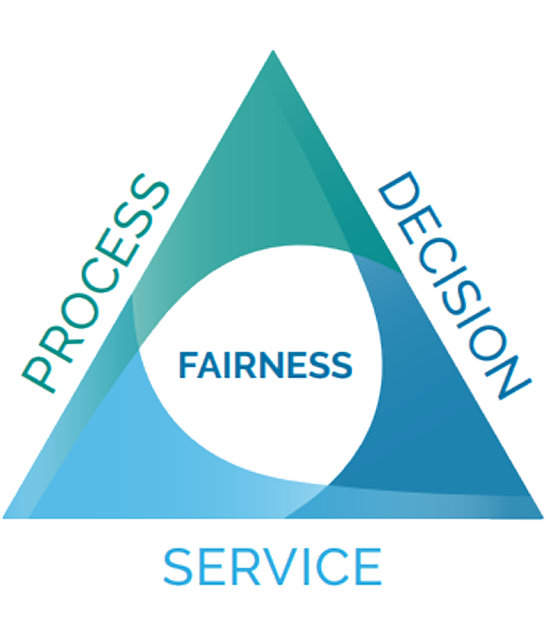Fairness in Administration
How can you ensure your organization delivers its programs and services fairly?
You can do this by building fairness into your policies and programs to support fairness in decision making and service delivery. Programs should be evaluated regularly to ensure the presence of fairness standards.
Although we all may have an instinctive sense of what fairness is, it can be a difficult concept to define. There are often different views of the requirements of fairness as well. In collaboration with ombud offices across Canada, we have created guidance with supporting tools to help public bodies build fairness into their practices.
Manitoba Ombudsman uses these standards to assess whether administrative fairness and natural justice prevailed in a decision or action taken by a public body. We focus on the three aspects of fairness shown in the fairness triangle below: fair processes, fair decisions, and fair services.

There are fairness standards to guide public bodies within each aspect of the fairness triangle.
These standards include:
Fair Process
1. Participation
- Notice
- Process information
- Opportunity to be heard
- Opportunity to appeal
- Reasons for decisions
- Communication
- Timeliness
2. Integrity and impartiality
- Decision free from personal interest, preference, or prejudice
- Review by independent decision maker
- Conflict of interest protections
- High ethical and professional standards
- Code of conduct policies
Fair Decision
3. Just and lawful
- Consistent with law and policy
- Not arbitrary, but logical and understandable
- Not oppressive or unreasonable
- Not improperly discriminatory
- No unreasonable impediments to access
4. Equitable
- Decisions based on complete and relevant information
- Consider specific circumstances
- Each case decided on its merits
- Appropriate exercise of discretion
Fair Service
5. Accessibility
- Accurate information, publicly available
- Online and printed formats
- Use plain language
- Incorporate accommodation standards
- Make access to your organization easy to a diverse range of people
- Culturally safe and inclusive spaces
6. People-centered
- Timely, accurate and respectful service
- Fair consideration of people’s needs and circumstances
- Appropriate privacy protection
7. Accountability and continuous improvement
- Robust, accessible complaints process
- Know who is responsible for handling and responding to complaints
- Culture of quality review
- Continuous service improvement
Assessment
Fairness assessment requires a critical examination of existing and proposed systems and policies, taking steps where needed to improve processes to ensure they are administratively fair. This includes assessing whether your organization is meeting fairness obligations set out in your governing legislation, provincial ombudsman legislation, administrative law fairness principles, and also meeting broader societal fairness standards.
Why your organization should do a fairness assessment:
- Demonstrates a commitment to fairness, which can increase public confidence
- Supports fair decision making and service delivery
- Gives your employees confidence they are treating the public fairly
- May reduce complaints, improve stakeholder satisfaction and improve staff morale
- May enable your public body to resolve issues more quickly and efficiently, saving time and money


